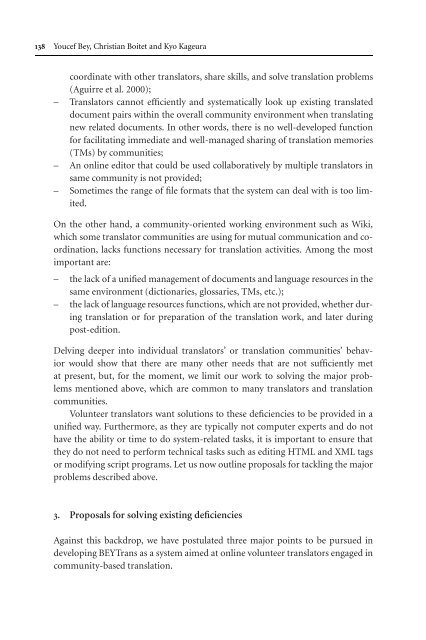Topics in Language Resources for Translation ... - ymerleksi - home
Topics in Language Resources for Translation ... - ymerleksi - home
Topics in Language Resources for Translation ... - ymerleksi - home
- No tags were found...
Create successful ePaper yourself
Turn your PDF publications into a flip-book with our unique Google optimized e-Paper software.
138 Youcef Bey, Christian Boitet and Kyo Kageuracoord<strong>in</strong>ate with other translators, share skills, and solve translation problems(Aguirre et al. 2000);– Translators cannot efficiently and systematically look up exist<strong>in</strong>g translateddocument pairs with<strong>in</strong> the overall community environment when translat<strong>in</strong>gnew related documents. In other words, there is no well-developed function<strong>for</strong> facilitat<strong>in</strong>g immediate and well-managed shar<strong>in</strong>g of translation memories(TMs) by communities;– An onl<strong>in</strong>e editor that could be used collaboratively by multiple translators <strong>in</strong>same community is not provided;– Sometimes the range of file <strong>for</strong>mats that the system can deal with is too limited.On the other hand, a community-oriented work<strong>in</strong>g environment such as Wiki,which some translator communities are us<strong>in</strong>g <strong>for</strong> mutual communication and coord<strong>in</strong>ation,lacks functions necessary <strong>for</strong> translation activities. Among the mostimportant are:– the lack of a unified management of documents and language resources <strong>in</strong> thesame environment (dictionaries, glossaries, TMs, etc.);– the lack of language resources functions, which are not provided, whether dur<strong>in</strong>gtranslation or <strong>for</strong> preparation of the translation work, and later dur<strong>in</strong>gpost-edition.Delv<strong>in</strong>g deeper <strong>in</strong>to <strong>in</strong>dividual translators’ or translation communities’ behaviorwould show that there are many other needs that are not sufficiently metat present, but, <strong>for</strong> the moment, we limit our work to solv<strong>in</strong>g the major problemsmentioned above, which are common to many translators and translationcommunities.Volunteer translators want solutions to these deficiencies to be provided <strong>in</strong> aunified way. Furthermore, as they are typically not computer experts and do nothave the ability or time to do system-related tasks, it is important to ensure thatthey do not need to per<strong>for</strong>m technical tasks such as edit<strong>in</strong>g HTML and XML tagsor modify<strong>in</strong>g script programs. Let us now outl<strong>in</strong>e proposals <strong>for</strong> tackl<strong>in</strong>g the majorproblems described above.3. Proposals <strong>for</strong> solv<strong>in</strong>g exist<strong>in</strong>g deficienciesAga<strong>in</strong>st this backdrop, we have postulated three major po<strong>in</strong>ts to be pursued <strong>in</strong>develop<strong>in</strong>g BEYTrans as a system aimed at onl<strong>in</strong>e volunteer translators engaged <strong>in</strong>community-based translation.
















